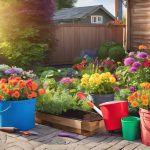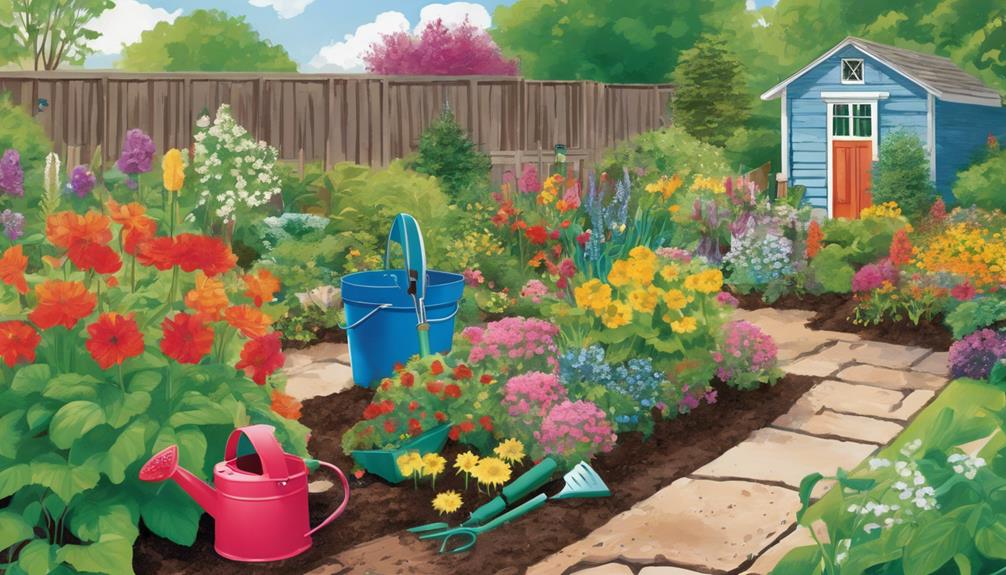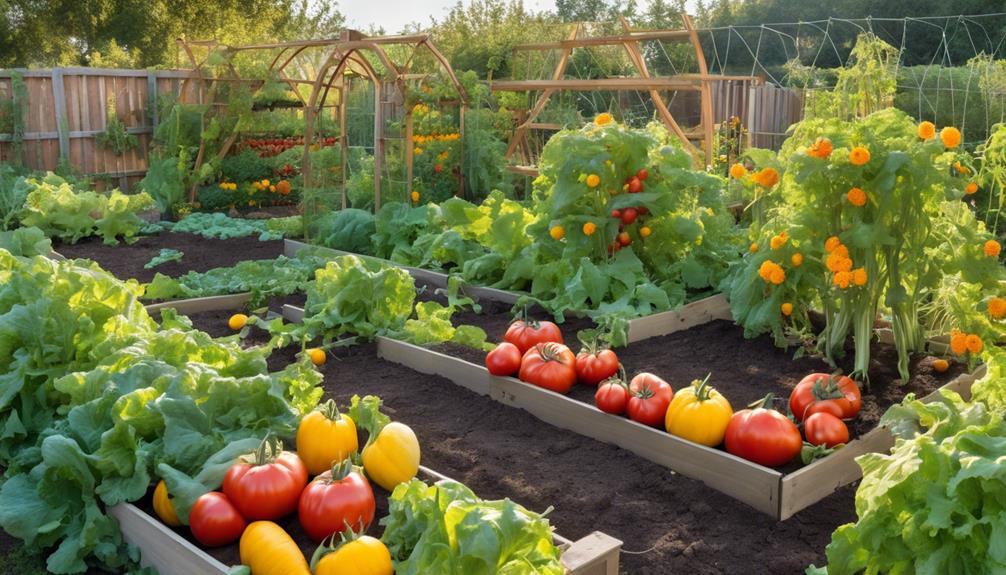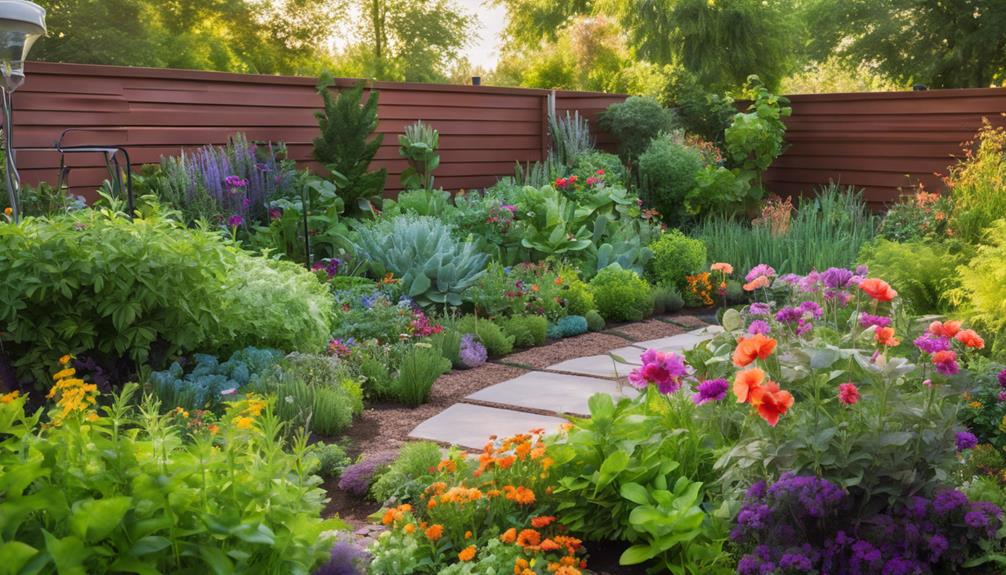
10 Best Budget-Friendly Garden Maintenance Tips for Families
30 September 2024
What Are Effective Year-Round Garden Maintenance Strategies?
30 September 2024To achieve thriving garden care year-round, adopt a multi-faceted approach that includes seasonal planting schedules, soil health management, and consistent maintenance practices.
Begin with early spring cool-season crops, transition to warm-season vegetables, and utilise succession planting for ongoing yields.
Prioritise soil quality through regular testing and organic amendments such as compost and mulch for moisture retention.
Implement effective pruning techniques and invest in quality tools for optimal maintenance.
Focus on plant resilience by selecting native varieties and exploring innovative pest control methods.
This comprehensive strategy lays the foundation for a flourishing garden throughout the year.
There is much more to explore in garden care techniques.
Seasonal Garden Maintenance Tips
Effective seasonal garden maintenance is essential for promoting healthy plant growth and maximising garden productivity.
A well-structured planting schedule, along with appropriate pruning and deadheading techniques, can greatly improve the overall appearance and vigour of your garden.
In this section, we will outline key strategies to ensure your garden thrives throughout the year.
Seasonal Planting Schedule
Planning a seasonal planting schedule is essential for maintaining a thriving garden throughout the year. This schedule should take into account your local climate, soil conditions, and plant varieties.
Begin by selecting cool-season crops such as spinach and kale for early spring, shifting to warm-season vegetables like tomatoes and peppers as temperatures rise. Late summer is the most favourable time for autumn planting, allowing for crops like carrots and beetroot to mature before frost.
Consider succession planting to enhance yields, staggering sowing times to ensure continuous harvests. Furthermore, incorporate perennials and annuals that bloom at different times, enhancing the garden's aesthetic appeal.
A well-structured planting schedule not only promotes health and productivity but also fosters a deeper connection with the gardening process.
Pruning and Deadheading Tips
Proper pruning and deadheading are essential components of seasonal garden maintenance, ensuring plants remain healthy and vibrant.
Pruning should be executed during dormancy for deciduous species, typically in late winter to early spring, to promote robust growth and shape. Focus on removing dead, damaged, or crossing branches, in addition to thinning crowded areas to improve airflow and light penetration.
In contrast, deadheading—removing spent flowers—should occur throughout the blooming season. This practice not only prolongs flowering but also redirects energy towards foliage and root development.
Use sharp, clean tools to make precise cuts, minimising stress on the plant. Mastering these techniques fosters a thriving garden, enhancing both aesthetic appeal and plant health, while encouraging a sustainable ecosystem.
Soil Quality and Composition
Soil quality and composition are essential to successful gardening, directly affecting plant health and growth.
Key strategies include adjusting pH levels for optimal nutrient availability, improving organic matter to enhance soil structure, and implementing mulching techniques to retain moisture.
Understanding and applying these methods can significantly improve the overall health of your garden.
Ph Level Adjustment Techniques
Maintaining an ideal pH level is crucial for promoting healthy plant growth and maximising soil quality.
pH influences nutrient availability and microbial activity within the soil, making adjustment techniques essential for optimal gardening.
To effectively manage soil pH, consider the following strategies:
- Lime Application: Use agricultural lime to raise pH levels in acidic soils.
- Sulphur Supplementation: Incorporate elemental sulphur to lower pH in alkaline soils.
- Compost Utilisation: Regularly amend soil with compost to gradually balance pH.
- Soil Testing: Conduct routine soil tests to monitor pH changes accurately.
- Liquid Amendments: Employ liquid fertilisers designed to adjust pH levels swiftly.
Implementing these techniques will empower you to create and maintain an ideal growing environment for your plants.
Organic Matter Enhancement Techniques
Improving organic matter in the garden is crucial for elevating soil quality and composition, which directly affects plant health and productivity. Implementing effective enhancement techniques fosters a thriving ecosystem within the soil, promoting nutrient availability and moisture retention.
- Composting: Convert kitchen scraps and garden waste into rich compost to enrich the soil.
- Cover Crops: Plant legumes or grasses during the off-season to fix nitrogen and prevent erosion.
- Green Manures: Incorporate specific plants into the soil to increase organic content before planting.
- Mulching: Use organic mulch that will decompose over time, adding nutrients back into the soil (discussed in the next subtopic).
- Worm Castings: Utilise vermicomposting to produce high-quality organic fertiliser that improves soil structure.
These techniques collectively improve soil health and promote sustainable gardening practices.
Mulching for Moisture Retention
Mulching serves as a crucial strategy for optimising moisture retention in garden beds, significantly enhancing soil quality and composition. By applying a layer of organic or inorganic material atop the soil, gardeners can markedly reduce evaporation, regulate temperature, and suppress weeds.
Benefits of effective mulching include:
- Moisture Conservation: Reduces water loss by minimising evaporation.
- Soil Structure Improvement: Enhances soil aeration and drainage.
- Nutrient Release: Organic mulches decompose over time, enriching the soil.
- Temperature Regulation: Insulates soil, protecting roots from extreme temperatures.
- Weed Suppression: Deters weed growth, reducing competition for resources.
Mastering mulching techniques not only ensures healthier plants but also contributes to sustainable gardening practices that promote long-term soil health.
Practical Tools for Garden Care
Effective garden care begins with the selection of appropriate tools tailored to specific tasks.
Regular maintenance and proper care of these tools are crucial for ensuring their longevity and performance.
Furthermore, mastering precision pruning methods can greatly enhance the health and aesthetics of plants in any garden.
Initial Tool Selection
When embarking on a gardening project, the selection of appropriate tools is crucial, as the right equipment can greatly streamline the process and enhance overall outcomes.
Investing in high-quality, practical tools not only boosts efficiency but also fosters a sense of mastery in your gardening endeavours.
Consider the following essential tools for your gardening toolkit:
- Hand Trowel: Ideal for planting, transplanting, and digging in confined spaces.
- Pruning Shears: Key for maintaining plant health through precise cuts.
- Garden Fork: Useful for turning soil and aerating compacted areas.
- Weeder: An essential tool for efficiently removing unwanted plants.
- Watering Can or Hose: Vital for ensuring proper hydration of your garden.
Selecting the right tools will lay a strong foundation for your gardening success.
Tool Maintenance and Care
Proper maintenance and care of gardening tools are vital for ensuring their longevity and optimal performance. Neglecting this aspect can lead to diminished efficiency and increased costs.
To maintain your tools effectively, consider the following strategies:
- Clean after use: Remove soil and debris to prevent rust and corrosion.
- Sharpen blades regularly: A sharp edge improves efficiency and precision in cutting.
- Lubricate moving parts: Use appropriate oils to ensure smooth operation and prevent wear.
- Store properly: Keep tools in a dry, organised space to avoid damage and loss.
- Inspect for damage: Regularly check for wear and tear, replacing parts as necessary.
Implementing these practices will not only extend the life of your tools but also enhance your gardening expertise.
Precision Pruning Methods
Maintaining gardening tools is the initial step towards achieving precision in pruning, as the right equipment directly influences the outcome of your efforts.
Employing effective pruning techniques not only promotes healthy growth but also enhances the aesthetic appeal of your garden.
To master precision pruning, consider the following tools and methods:
- Bypass Pruners: Ideal for clean cuts on live branches.
- Loppers: Perfect for reaching higher branches and thicker stems.
- Hand Saws: Essential for larger limbs that require more force.
- Pruning Shears: Useful for delicate shaping and smaller plants.
- Cutting Guides: Ensure accurate angles and prevent excessive damage.
Increased Plant Resilience
Many gardeners seek ways to improve the resilience of their plants, recognising that robust growth is essential for thriving gardens. Enhancing plant resilience involves strategic approaches, including soil health improvement, proper watering techniques, and selecting resilient plant varieties. Identifying and implementing these strategies can considerably bolster a garden's endurance against environmental stresses.
| Strategy | Benefits |
|---|---|
| Soil Health | Promotes nutrient availability |
| Drip Irrigation | Reduces water stress |
| Native Plant Selection | Adapts better to local conditions |
Innovative Pest Control Methods
Effective pest control is crucial for maintaining a healthy garden ecosystem, and innovative methods are emerging to meet this need.
Techniques such as the release of beneficial insects, natural pesticide applications, and homemade neem oil sprays provide sustainable alternatives to traditional pesticides.
These approaches not only target pests but also promote overall plant health and biodiversity.
Beneficial Insect Release Techniques
As gardeners increasingly seek sustainable solutions to pest management, the release of beneficial insects has emerged as a compelling strategy.
These natural allies not only control pest populations but also promote biodiversity within the garden ecosystem. Implementing effective release techniques is vital for maximising their impact.
- Timing: Release beneficial insects during ideal weather conditions to enhance survival rates.
- Habitat Preparation: Ensure a welcoming environment with adequate food sources and shelter.
- Target Selection: Identify specific pests to target, selecting beneficial species accordingly.
- Release Methods: Utilise techniques such as direct release or mass release for greater efficacy.
- Monitoring: Regularly assess pest levels and beneficial insect activity to adjust strategies as necessary.
Natural Pesticide Application Methods
While the introduction of beneficial insects can significantly enhance pest control, the application of natural pesticides provides an additional layer of protection for gardeners committed to sustainable practices.
Utilising natural pesticides can effectively manage pest populations whilst minimising harm to the environment. Here are some creative methods for applying these products:
- Soil Drenching: Apply diluted natural pesticides directly to the soil to target root pests.
- Foliar Spraying: Mist the leaves with natural pesticide solutions to combat surface infestations.
- Localised Application: Use targeted application techniques to treat affected areas, reducing overall pesticide use.
- Traps and Barriers: Incorporate traps with natural pheromones and barriers to deter pests.
- Timing: Apply during specific life stages of pests for maximum efficacy.
These strategies will enhance your garden's resilience while adhering to eco-friendly principles.
Homemade Neem Oil Spray
Neem oil, derived from the seeds of the neem tree, has gained popularity as a potent natural remedy for pest control in gardens.
This versatile oil effectively disrupts the life cycle of numerous pests while being safe for beneficial insects when applied correctly.
Preparing a homemade neem oil spray allows gardeners to harness its benefits effortlessly.
- Ingredients: Use 2 tablespoons of neem oil, 1 tablespoon of mild liquid soap, and 1 quart of water.
- Mixing: Combine all ingredients in a spray bottle, shaking well before each use.
- Application: Spray on affected plants in the early morning or late afternoon.
- Frequency: Apply every 7-14 days for optimal results.
- Storage: Keep the spray in a cool, dark place to maintain its efficacy.
Pest Management and Prevention
Effective pest management and prevention are essential for maintaining a healthy garden ecosystem.
Techniques such as companion planting can naturally deter pests, while soil erosion control plays a significant role in sustaining plant health.
Furthermore, adopting integrated pest management strategies allows gardeners to address pest issues holistically and sustainably.
Companion Planting for Pest Control
In the realm of sustainable gardening, companion planting emerges as a strategic approach to pest management and prevention. By cultivating specific plant pairings, gardeners can naturally deter pests, improve crop yields, and foster a balanced ecosystem. This technique relies on the biological interactions between plants, enhancing their resilience and vitality.
Key benefits of companion planting include:
- Pest Deterrence: Certain plants repel harmful insects.
- Attracting Beneficial Insects: Flowers can entice pollinators and predatory insects.
- Nutrient Boost: Some plants enhance soil nutrients for neighbouring crops.
- Disease Prevention: Diverse plantings reduce the spread of pathogens.
- Space Optimisation: Efficient use of garden space by combining plants with different growth habits.
Implementing these strategies fosters a healthier, more productive garden.
Soil Erosion Control Techniques
While companion planting plays a fundamental role in pest management, addressing soil erosion is another vital aspect of maintaining a healthy garden ecosystem.
Effective soil erosion control techniques not only safeguard your garden's integrity but also enhance biodiversity and nutrient retention. Implementing these strategies will strengthen your soil against degradation:
- Cover Crops: Planting species such as clover or rye can protect soil from wind and water erosion.
- Mulching: Applying organic or inorganic mulch helps retain moisture and minimises soil displacement.
- Terracing: Creating terraces on sloped land can slow water runoff and reduce erosion.
- Retaining Walls: These structures can stabilise soil in areas subject to heavy rainfall.
- Natural Barriers: Using stones, logs, or plantings can disrupt water flow and anchor soil effectively.
Integrated Pest Management Strategies
Integrated Pest Management (IPM) strategies provide a comprehensive approach to effectively control pests while minimising harm to the environment. By integrating biological, cultural, physical, and chemical tools, IPM fosters sustainable practices that enhance garden health.
Crucial components of IPM include:
- Regular Monitoring: Observe plant health and pest populations to make informed decisions.
- Cultural Practices: Implement crop rotation and proper sanitation to reduce pest habitats.
- Biological Controls: Utilise beneficial insects and microorganisms to manage pests naturally.
- Mechanical Controls: Employ barriers, traps, and manual removal to physically limit pest access.
- Targeted Chemical Use: Apply pesticides selectively and as a last resort to mitigate non-target harm.
Adopting these strategies guarantees a balanced ecosystem while promoting resilient garden growth.
Why Choose TKL Birmingham Gardener
Choosing TKL Birmingham Gardener guarantees a commitment to excellence in garden care, backed by years of experience and expertise.
Our team of skilled horticulturists employs advanced techniques and innovative practices, ensuring your garden flourishes through every season. We prioritise sustainability, integrating eco-friendly methods that promote biodiversity while enhancing the health of your landscape.
With a meticulous approach to design, maintenance, and problem-solving, TKL Birmingham Gardener transforms outdoor spaces into thriving ecosystems.
Our personalised service caters to the unique needs of each client, fostering a collaborative relationship that empowers you to achieve your gardening aspirations.
Trust in our dedication to quality and results, as we nurture your garden with precision and passion, elevating your gardening experience to new heights.
Common Gardening Questions Answered
Gardening can often raise numerous questions, especially for those new to the practice or seeking to improve their skills. Common enquiries include the best soil composition for specific plants, ideal watering techniques, and effective pest management strategies.
Understanding your climate zone is essential, as it influences plant selection and seasonal care. Furthermore, many gardeners wonder about the importance of crop rotation and companion planting to improve soil health and yield.
Fertilisation frequency and type often perplex novices; a balanced approach tailored to plant needs can yield significant improvements.
Future Planting Calendar Recommendations
A well-structured planting calendar can significantly enhance a gardener's ability to plan for seasonal changes and optimise plant growth.
To cultivate a thriving garden, it is crucial to adhere to a strategic timeline that aligns with climate variations and plant needs.
Consider the following recommendations for an effective planting calendar:
- Early Spring: Sow cool-season crops such as peas and lettuce.
- Late Spring: Shift to warm-season vegetables like tomatoes and peppers.
- Summer: Begin planting for autumn crops such as broccoli and kale.
- Autumn: Prepare for winter by sowing cover crops to enrich the soil.
- Winter: Evaluate and plan for the upcoming year, ensuring that the right tools and seeds are in place.
Adhering to these guidelines will enhance your gardening success and ensure peak plant health throughout the year.




